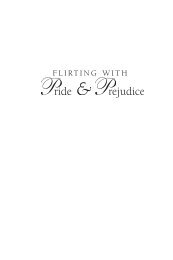Edited by Scott Westerfeld - Teen Libris
Edited by Scott Westerfeld - Teen Libris
Edited by Scott Westerfeld - Teen Libris
Create successful ePaper yourself
Turn your PDF publications into a flip-book with our unique Google optimized e-Paper software.
Lord Asriel: Dad from Hell or Heroic Rebel? 35<br />
Coulter’s influence as well before he went into exile: he made sure that<br />
Lyra’s mother would never have her. He did not want her to be brought<br />
up in the world of the Church, of course, but little did he care that she<br />
not only missed out on ideological indoctrination, she also missed out<br />
on having a mother.<br />
Or is that too harsh? Is the truth of the matter that, like so many revolutionaries,<br />
Asriel has deliberately burnt away all traces of gentler feeling<br />
in order that he may survive and fight another day, and perhaps also<br />
so that his daughter can survive as well? He must have some feeling for<br />
her that isn’t ideological, or else why does he look so horrified when she<br />
comes into his house in Svalbard, and he thinks she is the child who<br />
must be sacrificed so he can cross into other worlds? And keeping her<br />
from her mother may not have had a solely ideological purpose; he may<br />
have recognized the emotional and spiritual harm Mrs. Coulter could<br />
have done to her daughter. In this reading, Asriel is a heroic rebel who<br />
gives up all that makes life worthwhile for most people, for the benefit<br />
of the “greater good.” Life will be better in the “Republic of Heaven”<br />
than it was in the old tyrannous Kingdom, or so he firmly believes. And<br />
that means for his daughter, too.<br />
Many commentators have pointed to the fact that the trilogy is not<br />
only inspired <strong>by</strong> Milton’s Paradise Lost, it is also a kind of anti-Paradise<br />
Lost, in which God, or the Authority, becomes the enemy, and Satan, or<br />
the Rebel, becomes the hero. They’ve also pointed to Blake’s insight that<br />
Milton was of the Devil’s party without knowing it, because at least to<br />
post-Puritan sensibilities, Milton’s Satan appears to be the more heroic<br />
figure-or in any case the most interesting, and most accessible of the<br />
two, God being too arbitrary, tyrannous, remote, and unknowable.<br />
Paraphrasing Milton, Pullman himself has said that, “I am of the Devil’s<br />
party, and I know it” (Vulliamy).<br />
But although Asriel could be seen in many ways as a Satanic figure,<br />
interestingly, his name does not have a Luciferian ring. It is not one of<br />
the Devil’s many names that the author chose to riff on, but rather that<br />
of Azrael, as he is known in Hebrew lore, or Izrail, as he is known in<br />
Koranic lore: the Angel of Death.<br />
In the Koran, Azrael/Izrail (whose name means, ironically enough in<br />
our context, “whom God helps”) is depicted as the biggest of the angels,<br />
with a pleasing shape that differs according to the beholder. His raison



